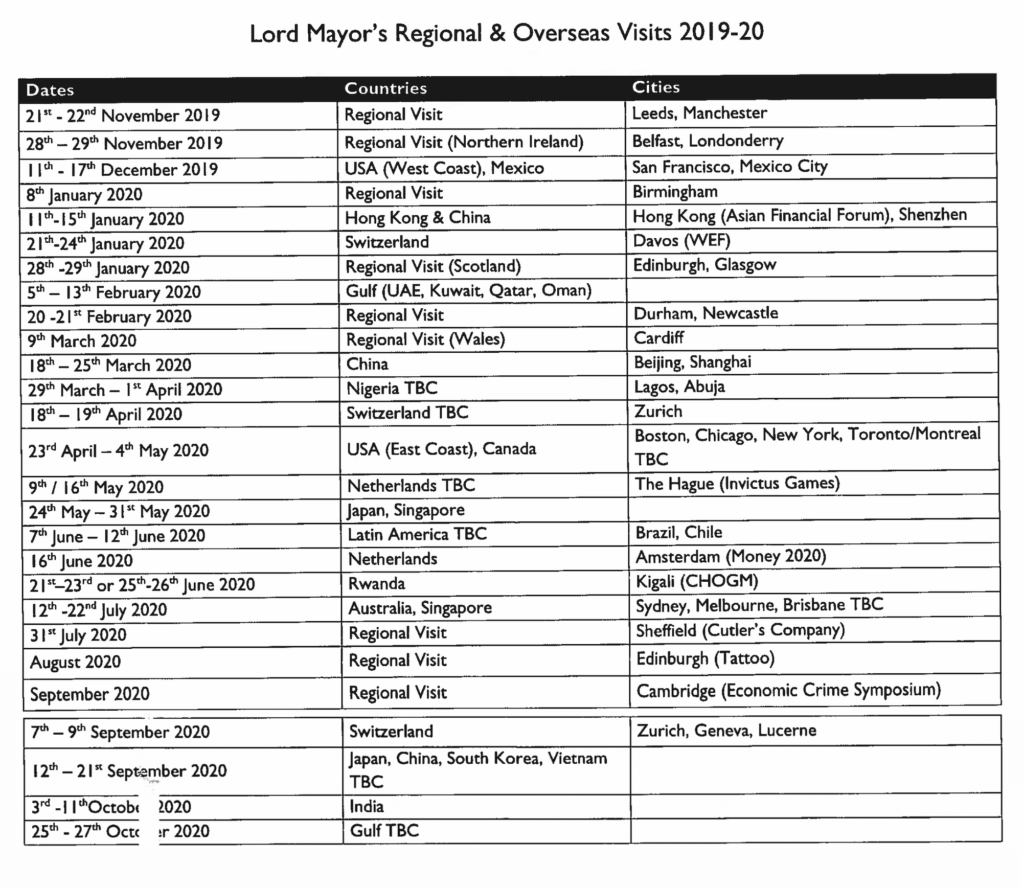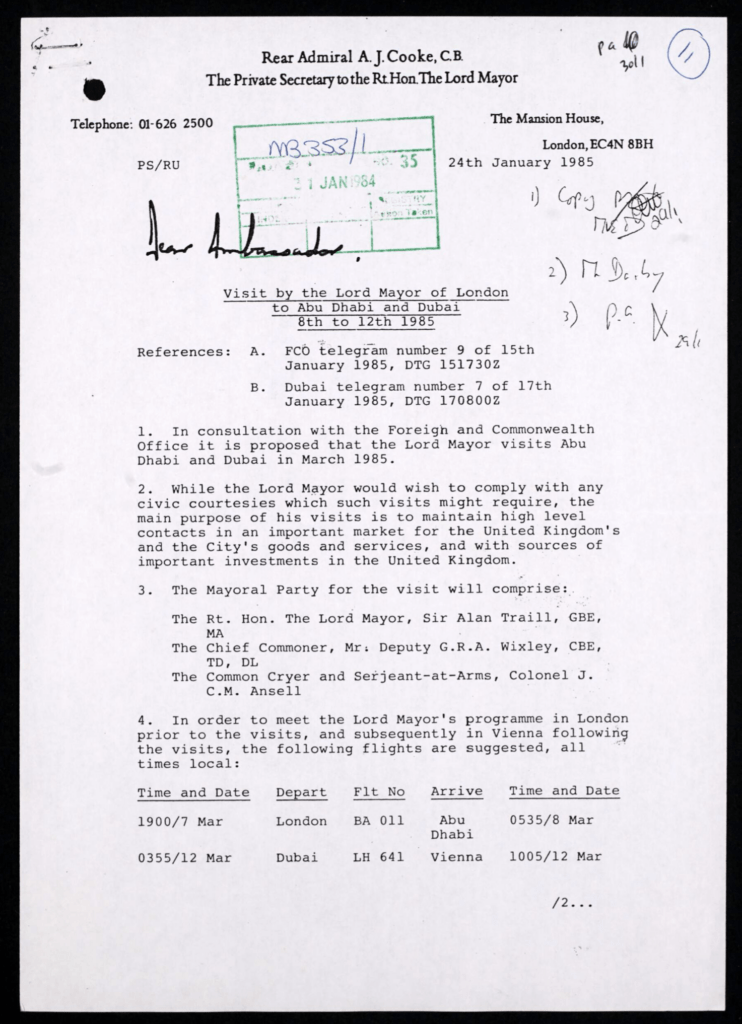The City of London Corporation is the municipal governing body of the City of London, where Britain’s financial interests are overwhelmingly located. Its primary function is to represent Britain’s financial services and banks at home and abroad.
The Corporation recently blocked Declassified’s request for the release of information about the foreign schedule of its leader, the Lord Mayor, but we have managed to see his 2019-20 agenda. This saw him planning to visit an average of three different foreign countries every month, considerably more than the foreign secretary typically does.
These visits have involved meetings with heads of state and other top officials in governments around the world.
The Corporation notes that these “overseas visits by the Lord Mayor offer a unique opportunity for accompanying business delegations to gain high-level access to influencers and key international decision-makers in government and business.”
However, it refused to provide Declassified with a list of foreign trips for its most senior official because the “information is not publicly available”.
A subsequent Freedom of Information Act request for the same information was rejected because the legislation only “applies to authorities where they are publicly funded”, the City added.
The Lord Mayor’s functions are privately funded, despite the fact he represents the UK on these trips abroad. His so-called Overseas Engagement Programme is organised in conjunction with the Foreign Office and the Department for International Trade.
The Lord Mayor’s international travel schedule drawn up for 2019-20 shows he planned to visit at least 30 countries. These included Gulf dictatorships such as the United Arab Emirates (UAE), Oman, and Kuwait, which are often praised by the Lord Mayor for their “free economies” and “excellent regulations”.
A City of London Corporation spokesperson told Declassified: “It is the role of the national government to lead on foreign policy. It is the role of City of London Corporation to support the City. As part of this role the City Corporation engages with business partners across the world and throughout the year.”

Finance
The City, or Square Mile as it has become known, was established around AD50, seven years after the Romans invaded Britain. After the Norman invasion, the City received its first royal charter in 1067, granted by William the Conqueror, which gave it special privileges.
Around 1189, the City gained the right to have its own mayor: what is now the Lord Mayor of London.
He is the most senior official in the Corporation, and “an international ambassador for the UK’s financial and professional services sector”. The position is usually held for a year and the Lord Mayor is meant to be “apolitical”.
Declassified found regular meetings take place between the Lord Mayor and British foreign ministers, which include discussions of his overseas trips. Declassified Foreign Office documents show the integral role the UK government has played in facilitating the Lord Mayor’s schedule since at least 1975, including arranging meetings with heads of state.
The Corporation appears to be an important part of Britain’s overseas diplomacy, despite being outside of democratic oversight. One declassified British file from 1985 shows a visit by the Lord Mayor to the UAE being planned “in consultation with” the Foreign Office.
The letter notes that the “main purpose” of the Lord Mayor’s “visits is to maintain high level contacts in an important market for the United Kingdom’s and the City’s goods and services, and with the sources of important investments in the United Kingdom.”
The Lord Mayor’s policy prescriptions appear to focus on privatisation and opening up countries to foreign investment.
After one trip to Mexico in 2017, the Lord Mayor said he was “particularly impressed by the successful liberalisation of the energy sector to foreign participants”. Mexico had recently decided to open its oil sector, historically monopolised by state-owned oil company Pemex, to private investment.
The Lord Mayor added that with “the exploitation of the oil and gas reserves in the Gulf of Mexico, there was a strong interest in the City’s offering as a global financial hub”.

The current Lord Mayor is William Russell, an Old Etonian who worked for US bank Merrill Lynch for 14 years. Russell stands to inherit his family’s baronetcy, a hereditary title introduced in the 14th Century and bestowed by the British Crown. The Corporation declined to give Declassified an interview with Russell on the subject of his foreign policy.
Last week, members of the Corporation’s livery companies, a type of trade body, approved corporate lawyer Vincent Keaveny to be the 693rd Lord Mayor, beginning in November.
The City is the only part of Britain over which parliament has no authority. However, it has its own representative within parliament. A person called The Remembrancer sits behind the Speaker’s chair in the House of Commons and ensures that the City’s interests are protected.
Clement Attlee, Labour prime minister from 1945-51, wrote in 1937: “Over and over again we have seen that there is in this country another power than that which has its seat at Westminster. The City of London, a convenient term for a collection of financial interests, is able to assert itself against the government of the country.”
But barely anything is known about precisely how the Corporation promotes policies to benefit finance around the world because information about its foreign policy is shielded from Britain’s transparency laws. By contrast, when ministers go on foreign visits, briefing notes prepared by government departments are subject to freedom of information requests.
Declassified recently requested the briefing notes prepared for the Lord Mayor’s January 2016 visit to Bahrain, another repressive Gulf dictatorship that is a close UK ally.
“The information that you have requested is outside the scope of the Freedom of Information Act”, the Corporation told us. “All costs for the Mayoralty are provided through non-public funds and used via City’s Cash to support the Mayoralty’s activities, including trips abroad.”
The City is funded from three sources. Its City Fund is a public, tax-based fund, whose operations are subject to transparency laws but the other two — City’s Cash, which includes endowments built up over the centuries, and funding from charities — are not.

Briefing against the prime minister
However, a window into the role the Lord Mayor plays in his international meetings comes from US diplomatic cables published by WikiLeaks.
In 2009, a cable sent by the US embassy in London back to Washington, reported on a meeting that the incoming Lord Mayor, Nick Anstee, had with two American officials from the embassy. At the time, Labour prime minister Gordon Brown was in power and floating new proposals to regulate finance in the wake of the financial crisis.
“The Lord Mayor criticized Prime Minister Brown for contradictory messages to the industry,” the cable – marked “confidential” – noted.
It added that “privately” Anstee “expressed annoyance that PM Brown had told him at the banquet that his speech was right on the mark, but then proceeded during the week to bash the banks over bonuses and pay packages”.
Anstee then criticised Gordon Brown’s progressive economic policy programme. “He [Anstee] called the Prime Minister’s support of a tax on global financial transactions just another way to punish the financial services industry and extract ‘a pound of flesh’”, the cable noted.
“He said the ‘Tobin Tax’ [a proposal to impose a levy on global financial transactions] was a ‘cynical’ tax, no different than the stamp duty that already applied to land and property transactions and that the City had been trying to abolish for years.”
Anstee further complained to the American officials that Brown’s plans for tax hikes on the wealthy comprised “a series of business unfriendly measures.”
The cable added: “Anstee also expressed concern about the direction of financial services regulation in the EU and urged the U.S. to make greater efforts to influence Europe.”
The US cable then noted: “Anstee said he hoped elections would be called as soon as possible” and “said the Conservative Party, if elected, would be justifiably worried about the level of debt it would inherit”.
But Anstee assured the Americans “that the Conservative Party was still largely in listening mode” since releasing its own financial services reform proposals. Anstee further told the US officials that “the City would arrange briefings for Conservative MP Mark Hoban and economic advisor James Sassoon in the coming months.”
Hoban, a senior manager at PriceWaterhouseCoopers before becoming an MP, was at the time the shadow financial secretary to the Treasury. Sassoon, an Old Etonian and former banker with UBS, was an adviser to then leader of the opposition, David Cameron, and George Osborne, then shadow chancellor.
The cable finished: “Although he principally holds a ceremonial position with heavy representational duties, the Lord Mayor’s views reflect the strong frustration of the UK financial services industry that the current government and PM Brown…are willing to punish banks to gain popularity with the ordinary voter”.
Brown’s Labour Party would go on to lose the following year’s general election. Mark Hoban and James Sassoon were both appointed Treasury ministers in the new Conservative-led government.


